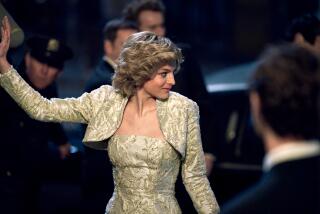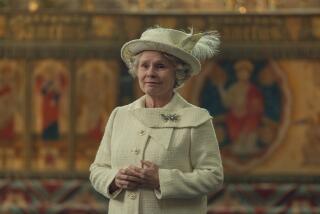Charles and Diana’s Short Honeymoon
- Share via
Within days of returning to England, the newly married royal couple held an informal press conference on the understanding that, afterward, the press would leave them alone. Everyone at this press conference reported that the couple were “simply in love,” unable to take their eyes or their hands off each other. Diana described the honeymoon as “fabulous” and said she “could highly recommend marriage.” She added, with a great smile, “It’s a marvelous life.”
The photographs released to the press--taken during and after the honeymoon--showed a bride and bridegroom very much in love and enjoying life together. When they came back from their honeymoon, they immediately joined the rest of the royal family at Balmoral. Diana rapidly came down to earth when she realized that life wasn’t always going to be like those lazy, sun-filled days she had enjoyed with her new husband on the royal yacht. For one thing, she no longer had her husband to herself. There were no opportunities for intimate moments or demonstrations of affection. Suddenly, her husband was public property, and she discovered that the most important person in his life did not seem to be his wife, but his mother.
It was her husband’s utter devotion and acquiescence to the queen, her mother-in-law, that first started to infuriate Diana. She felt that Charles would always side with his mother in any discussion, let alone an argument. No matter what views she expounded, even if he thought differently in private, he automatically agreed with his mother.
Diana told friends that when Charles was with his mother, he became a different person. Once, after Charles had told her she looked ravishing in a plunging neckline, the queen gently mentioned at dinner that the dress was a little revealing for a member of the royal family. Far from challenging his mother, Charles nodded his agreement with her opinion.
Diana had spent most of her life getting her own way, managing to persuade her father on many decisions. She didn’t like this one bit.
September, 1981, was a bad month for Diana. She simply couldn’t settle down to her new life as a member of the royal family. She was confused and unhappy; she spent most of her time walking around the estate on her own, her eyes filled with tears, not knowing what she was doing or whether she would ever fit into this strange existence.
When she was alone with Charles at night, she would try to explain how she felt. She begged him to take her home to Highgrove or London. She longed for the comforting familiarity of London and her friends; she wanted to browse round the smart Knightsbridge shops and see and talk to people she could relate to.
The highly disciplined Charles wouldn’t countenance the idea, knowing it would upset his mother.
On several occasions during the early days of marriage, Diana lost her composure. One minute she would burst into tears for no apparent reason, the next she would become frustrated, angry and resentful, often in front of others. Charles, brought up to avoid public displays, was embarrassed and unhappy at these emotional outbursts.
Charles had no idea what to do.
It seemed everyone else had more of a claim to his attention than she did. She became jealous of the hours Charles spent discussing whatever it was with his secretaries and officials. The more he continued to do so, the angrier she became. The people around Charles, who had spent years tending to his every need, began to feel her animosity toward them. It was a difficult situation for them as well.
To Charles, of course, a life almost entirely devoid of privacy was quite normal. He thought nothing of going away for two or three nights, returning home for a couple of nights, and then going off again to a distant part of the country to make another speech, open another factory or attend another meeting. Apart from his public engagements, he spent at least one day a week running the affairs of the Duchy of Cornwall. It had never occurred to him that things would be any different after he was married.
But Diana proved to be considerably more headstrong and opinionated than either Charles or the royal family expected. She had very definite ideas of how she wanted their married life to be, and that included spending time alone with Charles, not sharing him with assorted flunkies or seeing him only at dinner or, worse, only minutes before bedtime.
She began to complain and refuse to cooperate when engagements were planned for her and Charles. She would go through her diary with a lady-in-waiting and object to what had been arranged for the following day. Forthrightly, she would tell Charles she wasn’t going to do it.
To say that Charles was shocked is an understatement. The idea that a member of the royal family should refuse to carry out any official duties had never entered his mind; it was unthinkable. But Diana obstinately refused to give way. She was going to do what she wanted.
In November, 1981, only four months after their wedding, Charles began to realize communication had completely broken down between them. Diana, seemingly so docile before the wedding, didn’t seem likely to change. He didn’t want to tell his mother, because he knew she would suggest it was up to him to put his house in order and not tolerate any more nonsense from his wife. Charles was sensitive enough to realize that because Diana was floundering in a difficult, alien world, treating her aggressively would probably make her worse.
The couple’s marital problems worsened, as so many problems do, at Christmas. The family gathered en masse at Windsor Castle and then went on to Sandringham, the Norfolk house close to the home where Diana had been raised. She should have been happy being on home territory, but this time she had something else to make her angry: game shooting.
Most members of the royal family, particularly the duke of Edinburgh and Charles, are keen shots. It is very much “royal” sport. It is enjoyed by most of Charles’ friends and is taken with the utmost seriousness by those who participate. Being a good shot is a virtual necessity among most of the English aristocracy; regular holidays are planned around the shooting seasons. Rearing game birds to shoot is a peculiarly British upper-class pastime which leaves most of the rest of the people unmoved. Those who do not shoot consider it a slaughter of beautiful birds.
During that New Year’s holiday at Sandringham, shooting became a great bone of contention between the couple. Every day, as Charles was about to go out, he and his wife would argue violently. She would usually begin by asking him not to go. Then she would plead. Finally she would shout obscenities at him, describing in no uncertain terms what she thought of a man who could coldbloodedly kill harmless pheasant, partridge and grouse.
Charles was utterly dumbfounded that his wife could hold views so opposite to his. She had certainly never propounded such ideas when they were engaged and had been living close together for over four months. He was appalled by her behavior. Worst of all, she was becoming an embarrassment.
One morning at Sandringham, the queen was accompanying her son and husband, while they went out shooting, to watch the gun dogs at work. Charles asked Diana to go with them. She refused. He then tried persuasion, then pleading. Instead of yielding, Diana begged him to stay home with her, but Charles had already agreed to go. Staying with his wife was impossible.
More to Read
Sign up for Essential California
The most important California stories and recommendations in your inbox every morning.
You may occasionally receive promotional content from the Los Angeles Times.













